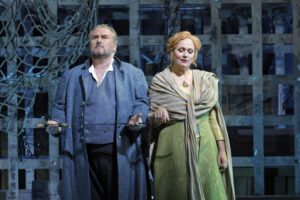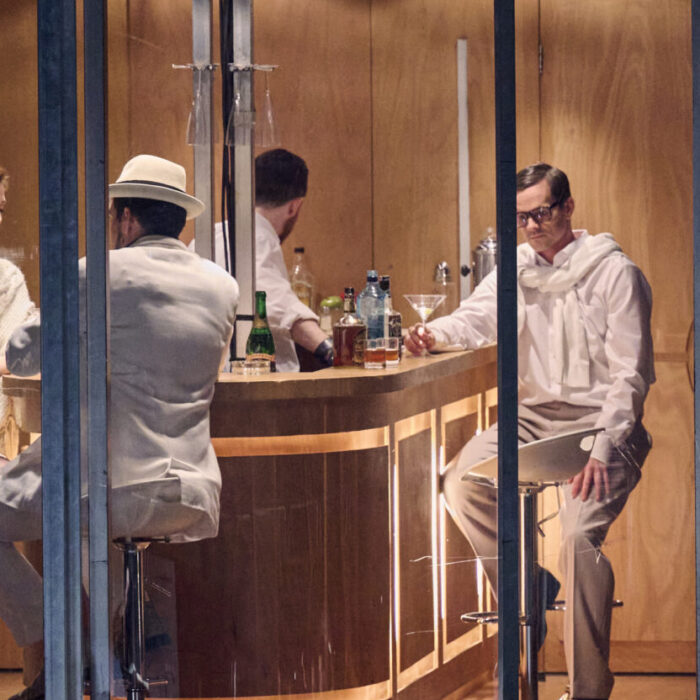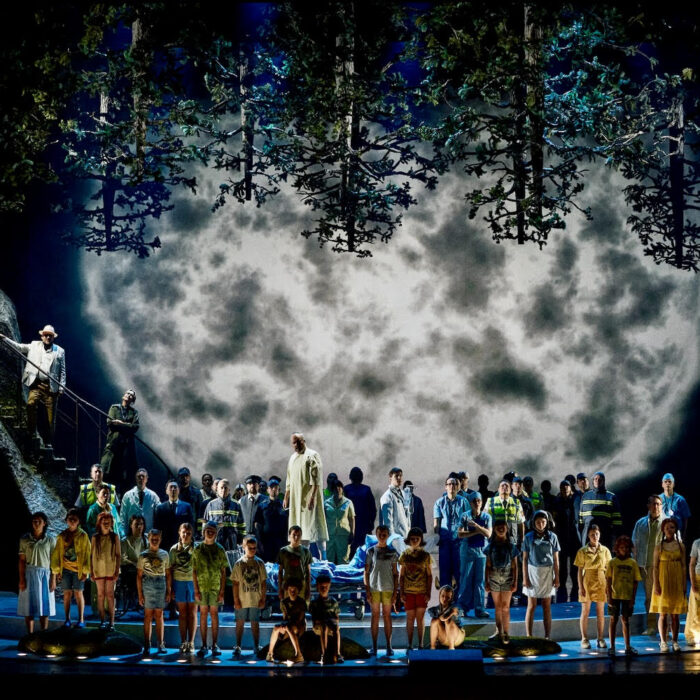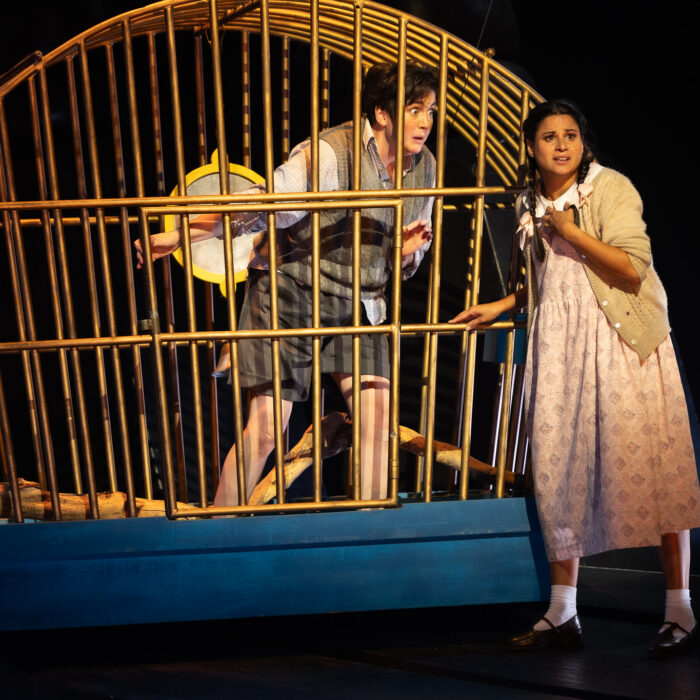
San Francisco Opera 2024-25 Review: Tristan und Isolde
Anja Kampe, Simon O’Neill & Eun Sun Kim Lead a Musical Tale Beyond the Imagination
By Lois Silverstein(Credit: Cory Weaver)
Whether you view Richard Wagner’s opera, “Tristan und Isolde,” as an expressive tale of universal human redemption or simply a unique take on the many medieval romances of love and death, there is no question it casts a spell. In the opening of San Francisco’s new production by Paul Curran, conducted by San Francisco’s own Eun Sun Kim, with the San Francisco Opera Orchestra of 72 , both in the pit and backstage, the magic of the spell did not come until Act two, after being initiated by the last moments of Act one, when Tristan and Isolde drank the potion. Up until then, we were pinioned in an extended conversation between two women and between two men about important, but only partially disclosed, issues. Eun Sun Kim pressed the pace and drove it as a dramatic, on-earth type of story. But as Isolde and Tristan sailed from the day-light conversation into their night dream world of love that magic was cast, and it was uplifting to move from the lovers and their personal attendants, to a realm both beauteous and filled with promise. At this point, we truly settled into our seats.
Anja Kampe as Isolde Gives Extraordinary Performance
German soprano Anja Kampe sang Isolde. She came on as a would-be liberated woman from the first, although dressed like a refugee sitting on a cargo box in the belly of the big ship. Was that indeed the extraordinary Irish princess courted by Tristan for King Marke? As the scene began to unfold, however, she revealed that she was the bridal reward to King Marke. She was angry over it, frustrated, confined. “Luft, luft./Mir estick das Herz/ Air, air. (Oh, my heart constricts). Offne! Offne!dort weit! (Open, open, there, wide).” She could not breathe while being so constrained. Her early words revealed anger, frustration, intolerance. She strode across the stage like an Amazonian princess. She raised her right arm over and over as if to strike someone for contributing to this. She sang with sharp tones, with bite. She almost shouted revealing that she’d even use her mother, a once-upon-a-time sorceress’s potions to kill the culprit who led her to this fate. Kampe’s Isolde clearly would not stay in thrall. She willed to extricate herself, from Act one until the Finale, from a world in which women didn’t count. In Act two, when she sang of her passionate love for Tristan she continued to disclose this commitment, though now singing with love-struck ardor, full-bodied resonance and “geist,” spirit, if sometimes with a jolting vocal attack. By Act three, she became a grand Isolde, even standing over Tristan’s dead body rather than collapsing into it. She’d pushed Brangaene, she’d pushed Tristan, she’d pushed her prescribed fate. Clearly, it was her opera.
Heldentenor Simon O’Neill as Tristan Goes Beyond the Imagination
Tristan, sung by well-known heldentenor, New Zealander Simon O’Neill, took time to commit himself both vocally and dramatically. He confined his early singing to a small circumference, at moments, even hollow. Looking upward then at Isolde and keeping his actions distinct from her demands, he also kept the reins on his vocal power. As he committed to her, he sang with more range, expanding from a more introverted expression to ecstatic. By Act three, when he wrestled with his hallucinations of the any-minute-to-arrive Isolde, to heal him, to hold him, to let him creep into her being, some way, somehow, and then die, he shone. When he grasped the water bottle, the same time he was grasping thin air, it was as if he were grasping for life itself. His whole body rose and fell with the weight of conviction. O’Neill entered his own world here, the horns repeating their motif four times, and left even Isolde’s world as he fell into her eager arms, as he died. He was no longer in misery; it seemed as if he left his suffering and yearning behind, which was the message of the opera itself – not simply the love between the two, but the platform from which he, and ultimately, she, could go beyond it. Following the through-line of their devotion, we found ourselves moving past it, and transfixed as the curtain fell. A spell? In this production, a liberated choice.
More Cast Highlights
Brangaene was sung by Annika Schlicht, in her San Francisco debut, with rich, round tones, if overly-hooded at the outset, and difficult to understand. Throughout she tried to tame Isolde, and get her in line with a more “conventional” behavior, girlish infatuation aside. She sang with increasing clarion and commitment when it became a question of her loyalty and to Isolde and finally her grief.
Kurwenal, German baritone Wolfgang Koch, making his San Francisco Opera debut, remained close, hovering even, intimate, actively loving and devoted, thus embodying his loyalty.
Marke, sung by bass Kwangchul Youn, conveyed his judgment in a steely vocal and postural fashion, only granting the lovers pardon after he learned about the potion. Sympathy even then seemed verbal rather than visceral. Melot was sung richly by Thomas Kinch, both the Sailor and the Shepherd sung by Christopher Oglesby, whose choice for a piano version of the well-known “meine Irisch Kind” seemed a bit too soft, and the Steersman sung by Samuel Kidd, all making their San Francisco debuts. The sailor chorus, sung from offstage, was rousing and a jolt out of the dreamy, langorious world we had settled into.
Notable Production Details
Other notable things about the production included Robert Innes Hopkins‘s stage design, including the ship in its interstices with its strong sense of enclosure and its opening split on their arrival in Cornwall, Marke standing at apex. That was indeed effective. The lit-up potion box seemed garish and melodramatic, particularly since the sorcery theme was not more than verbally developed. So too, the courtyard tree, a foreshadowing of “Parsifal” but in this case adding nothing to the similar sense of personal realization. The sudden termination of the lights when the lovers drank the potion spoiled the dramatic possibility of seeing the lovers turn from the ordinary to the more transformed beings. The stage formations were effective, stately, in the Greek tradition. They helped us follow the story with ease, especially after Act one.
Eun Sun Kim conducted the monumental score for the first time with energetic control. She never lapsed into melodramatic moments, spinning out legato for its own sake. Further, she handsomely highlighted the many instrumental contrasts, harp and horns, strings and bassoon, the trumpet and the oboes, thereby strengthening the complexities of idea, mood, psychologically shifting intimacies. The marriage of the text and the music here as always when heard is remarkable. The tender and simple shepherd sounds were deeply moving. Kim brought the sense of yearning that pervaded the whole performance alive – the yearning for arrival, yearning for love, yearning for death. The horn solo at the beginning of Act three marked it particularly well. Haunting, melancholy, yoking the sophisticated world of nobles and knights with the ordinary peasant world, it helped to emphasize Wagner’s idea of how human beings are connected in matters of love and death. The whole piece, the extraordinary music above all, from Prelude to Finale, rich with leitmotifs working not only for their ingenious harmonies but for such a thematic statement whether we fight, love, badger, battle, hate, or die. Life’s fabric was invincible, the whole work transmitted, and a perception that experiences it otherwise literally misses out. Love between Tristan and Isolde, Kurwenal and Tristan, Marke and Tristan, Brangaene and Isolde accentuated the point. Even the suffering portrayed the production Wagner claimed was the suffering beyond that world-view.
As the curtain fell, reluctantly, we moved back to the streets of San Francisco, which, however melancholy, savored of the mystery of the lost and the eternal. “Doch unsre Liebe,/heisst sie nicht Tristan und – Isolde?/Dies süsse Wörtlein: und,/was es bindet,/der Liebe Bund,/wenn Tristan stürb,/zerstört’ es nicht der Tod? …(But our love,/is it not Tristan/and Isolde?/This sweet little word: and,/would death not destroy/the bonds of love/which it entwines/if we, [sic] were to die?)” The answer is no, for we left the opera house with those words and that lustrous music lingering in us, more than alive.


